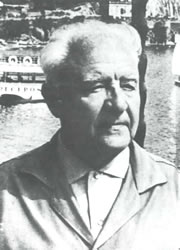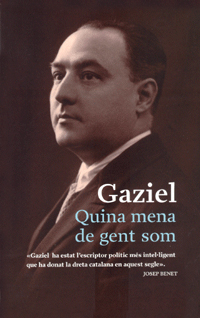Gaziel facts for kids
Quick facts for kids
Agustí Calvet Pascual
|
|
|---|---|
 |
|
| Born | October 7, 1887 Sant Feliu de Guíxols, Spain
|
| Died | April 12, 1964 Barcelona, Spain
|
| Nationality | Spanish |
| Occupation | Journalist, writer and publisher |
Agustí Calvet Pascual (born October 7, 1887 – died April 12, 1964) was a Spanish journalist, writer, and publisher. He was born in Sant Feliu de Guíxols and passed away in Barcelona. He is best known by his pen name, Gaziel.
Contents
Gaziel's Early Life and Career
Agustí Calvet Pascual studied different subjects in Barcelona and Madrid. He earned a special degree called a doctorate. His main project for this degree was about a historical figure named Anselm Turmeda. This work was published in 1914.
After his studies, he went to Paris to learn even more. When the First World War started, he became a special reporter for La Vanguardia. This was a very important newspaper in Barcelona. His reports were so popular that they were published in four books. These books included Diary of a student in Paris (1916) and In the fire lines (1917). This is when he started using the name Gaziel for his writings. He also got married to a French woman in 1914.
Working as a Journalist
In 1931, when the Second Spanish Republic was created, Gaziel supported it strongly. However, after 1934, he became worried about the social and political problems in Spain.
Before the Spanish Civil War began, Gaziel became the main editor of La Vanguardia. Many people thought he was the best political thinker in Spain. When the war started in July 1936, he had to leave Barcelona and go to France. It was too dangerous for him to stay. His home in Barcelona was also damaged, and his valuable book collection was lost.
Life After the Spanish Civil War
In 1940, Gaziel was in Brussels when Germany invaded Belgium. This made him return to Spain. However, the new government in Spain, led by Franco, was not friendly to him. Even though he had supported their side during the war, he was not allowed to return to his job at La Vanguardia.
Because of this, he moved to Madrid. There, he worked as the general manager of a publishing company called Editorial Plus Ultra.
Writing About Spain and Europe
In the late 1940s, Gaziel wrote a book called Meditations in the desert. In this book, he shared his sad thoughts about Spain and Europe after the war.
In the early 1950s, he traveled a lot through different parts of Spain and Portugal. These trips inspired him to write a series of three books, known as his Iberian trilogy. These books were Portugal far away, Castile inside, and The unfinished peninsula. In them, he wrote about his travels and shared deep thoughts about the history and connections between Portugal, Catalonia, and Castile (which is a big part of Spain). He cared a lot about these relationships throughout his life.
In The unfinished peninsula, Gaziel wrote about a spring afternoon he spent on a beach in Estoril. He thought about his life and the three big wars he had seen: the First World War, the Spanish Civil War, and the Second World War. He also thought about the situation in Europe at that time.
Later Works and Retirement
Gaziel also traveled to Switzerland and Italy for meetings about publishing. These trips led to two more books: Sensibleness, work and freedom and The man is everything. In the first book, which some consider his best, he greatly admired Switzerland's political and social system. He thought it could be a good example for Spain's different regions. In the second book, he was amazed by the beautiful Renaissance art in Florence. He also shared his strong dislike for what he called "mass society."
In 1959, Gaziel retired from Editorial Plus Ultra and moved back to Barcelona. He started writing full-time again. People in Barcelona's cultural world were surprised to see him writing so much at 72 years old. Just before he passed away in 1964, he finished a book called History of La Vanguardia (1881–1936). This book is very important for understanding Spanish journalism.
In October 2009, a new collection of Gaziel's articles about the First World War was published. It was called In the trenches and included some articles that had not been published in books before.
Gaziel's Views on Language and Culture
Gaziel could write beautifully in both Catalan and Spanish. He published many works in both languages. Even though he wrote almost daily in Spanish for La Vanguardia for twelve years, he always felt like a true Catalan. However, he never fully supported Catalan nationalism. He made this clear in his book published after his death, What kind of people are we.
From a young age, Gaziel loved French culture. This feeling grew stronger throughout his life. But he was always sad that French people often didn't know or care much about the history and special qualities of Northern Catalonia (the part of Catalonia under French rule). Later in his life, he developed a dislike for American culture, but not for political reasons. He also had a very bad experience with a publishing business he tried to start in Colombia in the early 1940s, which made him think negatively about Latin American societies.
Overall, Gaziel was a liberal and conservative person who focused on Europe. Like many educated people of his time, he understood that the world had changed a lot in the first half of the 20th century. He even wrote in Portugal far away: "I am not any more a man of the present times, neither of the future."
See also
 In Spanish: Gaziel para niños
In Spanish: Gaziel para niños
- Manuel Chaves Nogales
 | Delilah Pierce |
 | Gordon Parks |
 | Augusta Savage |
 | Charles Ethan Porter |


